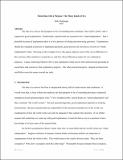Theorizing with a Purpose: The Many Kinds of Sex
Author(s)
Haslanger, Sally
Downloadtheorizing_with_a_purpose_final_june_2.pdf (254.1Kb)
OPEN_ACCESS_POLICY
Open Access Policy
Creative Commons Attribution-Noncommercial-Share Alike
Terms of use
Metadata
Show full item recordAbstract
The idea of a natural kind purports to be of something that constitutes “the world’s joints” and is captured in good explanations. Traditionally, natural kinds are assumed to be “mind-independent.” But a plausible account of explanation takes it to be a practice of asking and answering questions. Explanations should be evaluated as answers to legitimate questions; good answers are not always in terms of “mindindependent” kinds. Drawing on the example of sex, this paper explores some of the ways differences in the word are either marked or created by us, and how these differences matter for our explanatory purposes. I argue, following Epstein (2015), that explanatory kinds can be both anchored and grounded in social facts and, moreover, that explanatory projects – like other practical projects - depend on theoretical scaffolds to provide means toward our ends.
Date issued
2015-12Department
Massachusetts Institute of Technology. Department of Linguistics and PhilosophyJournal
Natural Kinds and Classification in Scientific Practice
Publisher
Taylor & Francis
Citation
Haslanger, Sally. "Theorizing with a Purpose: The Many Kinds of Sex." Natural Kinds and Classification in Scientific Practice. Routledge, 2015.
Version: Author's final manuscript
ISBN
9781848935402
9781315619934
9781317215431